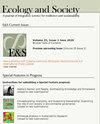The role of socio-demographic characteristics in mediating relationships between people and nature
IF 3.2
2区 社会学
Q1 ECOLOGY
引用次数: 4
Abstract
Research on ecosystem services has focused primarily on questions of availability or supply and often assumes a single human community of identical beneficiaries. However, how people perceive and experience ecosystem services can differ by sociodemographic characteristics such as material wealth, gender, education, and age. Equitable environmental management depends on understanding and accommodating different perceptions of ecosystem services and benefits. We explored how socio-demographic characteristics influence people’s perceptions of birds. We identified morphological and behavioral traits of birds that people care about and used these to group bird species into “cultural functional groups.” Cultural functional groups of birds are defined by shared characteristics that local people perceive as contributing to cultural ecosystem services or disservices (in the same way that foraging guilds for birds can be defined by dietary information). Using perception data for 491 bird species from 401 respondents along urbanrural gradients in South Africa, we found that socio-demographic characteristics were strongly associated with human preferences for different avian cultural functional groups. Our results provide a strong quantitative demonstration that the provision of cultural ecosystem services and benefits depends on the recipient of the service and not just on the ecological community that is present.社会人口特征在调节人与自然关系中的作用
对生态系统服务的研究主要集中在可得性或供应的问题上,并经常假设一个具有相同受益者的单一人类社区。然而,人们如何感知和体验生态系统服务可能会因物质财富、性别、教育和年龄等社会人口特征而有所不同。公平的环境管理取决于理解和适应对生态系统服务和效益的不同看法。我们探讨了社会人口特征如何影响人们对鸟类的看法。我们确定了人们关心的鸟类的形态和行为特征,并利用这些特征将鸟类分类为“文化功能群”。鸟类的文化功能群体是由当地人认为对文化生态系统有益或有害的共同特征来定义的(同样,鸟类的觅食行会可以通过饮食信息来定义)。利用南非城乡梯度上401名调查对象的491种鸟类感知数据,我们发现社会人口统计学特征与人类对不同鸟类文化功能群的偏好密切相关。我们的研究结果提供了一个强有力的定量证明,即文化生态系统服务和效益的提供取决于服务的接受者,而不仅仅取决于现有的生态群落。
本文章由计算机程序翻译,如有差异,请以英文原文为准。
求助全文
约1分钟内获得全文
求助全文
来源期刊

Ecology and Society
环境科学-生态学
CiteScore
6.20
自引率
4.90%
发文量
109
审稿时长
3 months
期刊介绍:
Ecology and Society is an electronic, peer-reviewed, multi-disciplinary journal devoted to the rapid dissemination of current research. Manuscript submission, peer review, and publication are all handled on the Internet. Software developed for the journal automates all clerical steps during peer review, facilitates a double-blind peer review process, and allows authors and editors to follow the progress of peer review on the Internet. As articles are accepted, they are published in an "Issue in Progress." At four month intervals the Issue-in-Progress is declared a New Issue, and subscribers receive the Table of Contents of the issue via email. Our turn-around time (submission to publication) averages around 350 days.
We encourage publication of special features. Special features are comprised of a set of manuscripts that address a single theme, and include an introductory and summary manuscript. The individual contributions are published in regular issues, and the special feature manuscripts are linked through a table of contents and announced on the journal''s main page.
The journal seeks papers that are novel, integrative and written in a way that is accessible to a wide audience that includes an array of disciplines from the natural sciences, social sciences, and the humanities concerned with the relationship between society and the life-supporting ecosystems on which human wellbeing ultimately depends.
 求助内容:
求助内容: 应助结果提醒方式:
应助结果提醒方式:


